#and the work acting as a commentary on human made art
Explore tagged Tumblr posts
Text
Best of YouTube 2023
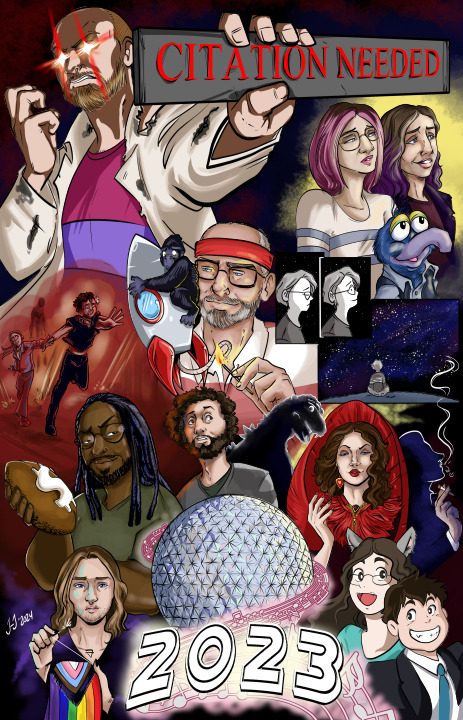
Yes, I did spend the first week and change of January on this. I wish I could have had it done for New Years, but too many people came out with incredible work in December, so waiting turned out for the best.
What these creators do are a huge influence on my life, I would honestly have difficulty doing what I do without them. That isn't to say that my favorites of the year are *only* on this image--It was almost impossible to narrow down my favorites. Many creators I wanted to include couldn't fit on a single page, and too many of them made more than one video I wished I could draw too!
But, to all of you, thank you for what you do. You're an inspiration.
For those who don't know, further is an explanation.
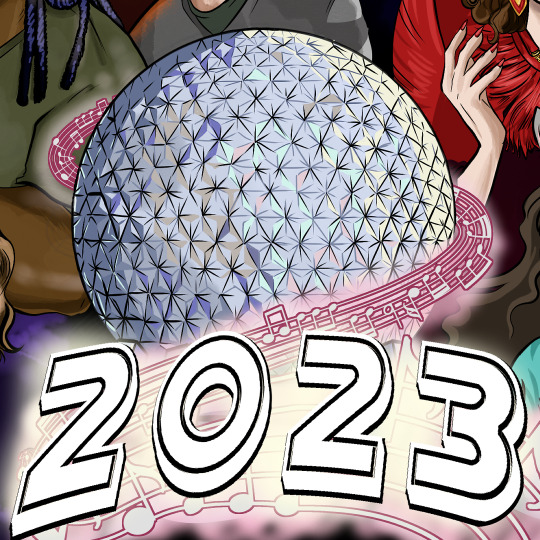
At the bottom center is an artistic masterpiece by Defunctland: "Journey to EPCOT Center: A Symphonic History." Over the last several years, Defunctland has risen from delightfully-entertaining commentary on decommissioned theme park attractions to occasionally dropping profound statements on the creation of art itself. "Journey to EPCOT Center: A Symphonic History" is worth treating like the cinematic experience it is: No second screen, you sit your ass down in front of a TV, set down the phone, and then you *watch it.* Any Disney, theme park, or independent film fan needs to pay attention to this one.
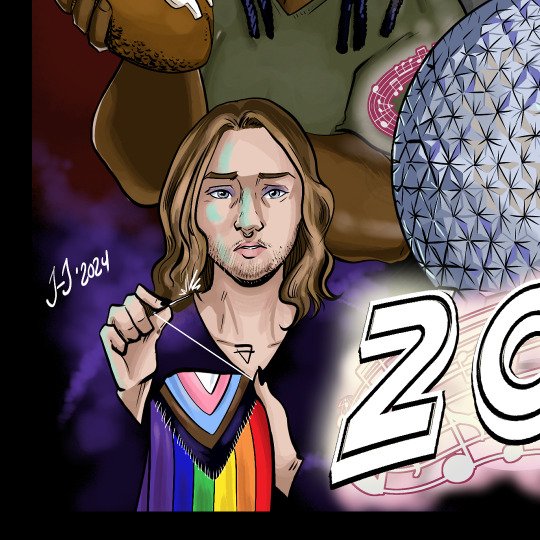
Bottom left is Caelan Conrad with their piece "Drop the T - The Deadly Consequences of Gay Respectability Politics." While I do think they've done more visually or artistically-daring pieces before, "Drop the T" is one of the most important videos released on YouTube in today's current climate of hate. We as queer folk (and our allies) need to understand how integral every identity of the queer experience has been since the start of the Civil Rights movement (and before!). While we are not identical, we *are* inseparable, and we deserve having our real history easily accessible.
TERFs and other conservative mouthpieces need not reply. Your opinions are trash. 😘
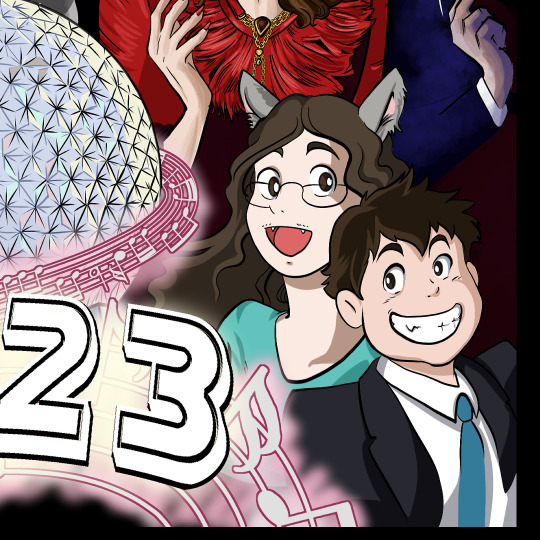
I cannot stop watching and rewatching this video by @patricia-taxxon, "On the Ethics of Boinking Animal People." It's not just a defense of furry fandom and its eccentricities, it's a thoughtful and passionate analysis of what the artform achieves that purely human representation can't. Patricia goes outside of her usual essay format to directly speak to the viewer about the elements that define furry media (the most succinct definition I've ever heard) and just how *human* an act loving animal cartoons really is.
As an artist who can draw furry characters, but never really got into erotic furry art, this video is a treasure. Why did I choose to have her drawn as a Ghibli character, hanging out with one of the tanukis from "Pom Poko?" Guess you'll have to watch, bruh.
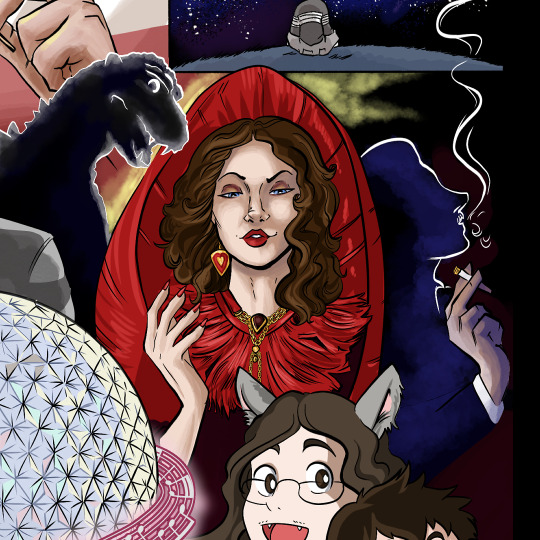
Philosophy Tube continuously puts out videos that I would put on this list--I'm not even sure that "A Man Plagiarised my Work: Women, Money, and the Nation" is the best work she released in 2023. However, this video got many conversations going between myself and my partner, and the twist on the tail end of the video shocked us both to such a degree that I had no choice.
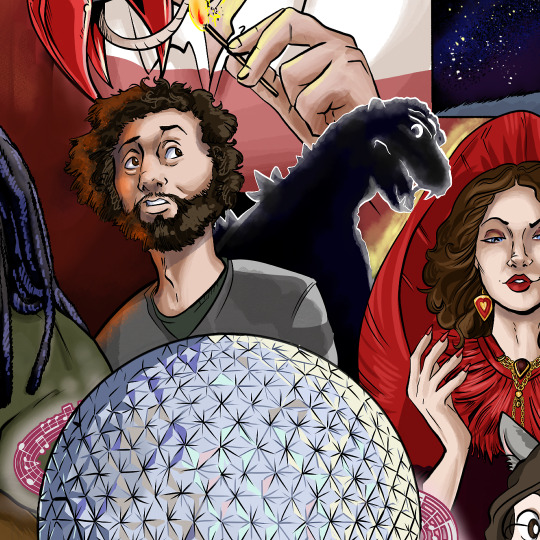
At the very tail end of the year, Big Joel released "Fear of Death." On his Little Joel channel, he described it as the singularly best video he's ever done, and I'm inclined to agree. However, for this illustration, I ended up repeatedly going back to a mini-series he did earlier in the year: "Three Stories at the End of the World." All three videos are deeply moving and haunting, and I was brought to tears by "We Must Destroy What the Bomb Cannot." While it may be relatively-common knowledge that the original Gojira (Godzilla) film is horror grappling with the devastation America's rush to atomic dominance inflicted on Japan, Big Joel still manages to bring new words to the discussion. Please watch all three of the videos, but if, for some reason, you must have only one, let it be "We Must Destroy What the Bomb Cannot."
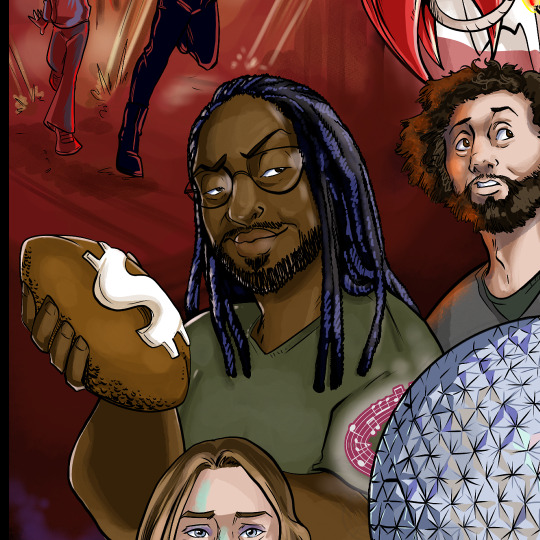
Y'all. Let me confess something. I hate football. I hate watching it, I associate seeing it from the stadiums with some of my worst childhood experiences, I despise collegiate and professional football (as institutions that destroy bodies and offer up children at the feet of its alter as a pillar of American culture)--
I. L o a t h e. Football.
But.
F.D. Signifier could get me to watch an entire hour-plus essay on why I should at least give a passing care. AND HE DID IT. I might think "F*ck the Police," the two-parter on Black conservatism, or his essay on Black men's connection to anime might be "better" videos, but this writer did the impossible and held my limited attention span towards football long enough to make a sincere case for NFL players--and reminds us that millionaires can *in fact* be workers. That alone is testament to his skill.
Sit down and watch "The REAL Reason NFL Running Backs Aren't Getting Paid." Any good anti-capitalist owes it to themselves.
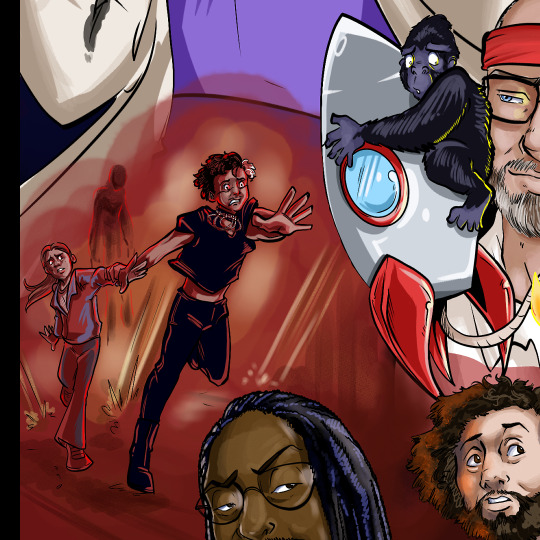
CJ the X continuously puts out stunning, emotional videos, and can do it with the most seemingly-inconsequential starting points. A 30 second song? An incestuous commercial? Five minutes of Tangled? Sure, why not. Go destroy yourself emotionally by watching them. I'm serious. Do it.
Their video Stranger Things and the Meaning of Life manages to to remind us all why the way we react to media does, in fact, matter. Yes, even nostalgia-driven, mass-media schlock. Yes, how we interact with media matters, what it says about us matters, and we all deserve to seek out the whys.
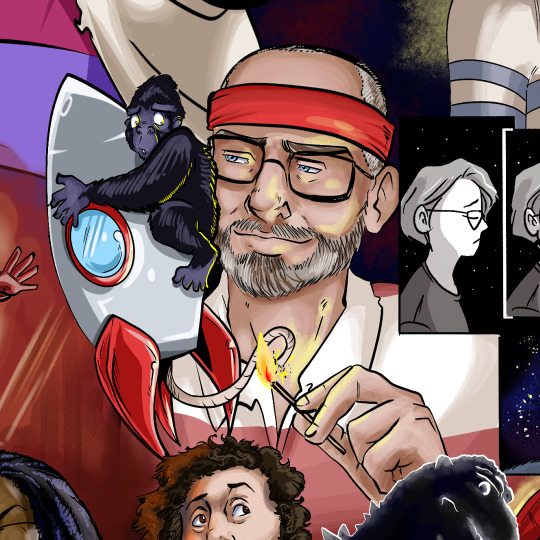
Folding Ideas has spent the last few years articulating exactly why so much of our modern world feels broken, and because of that his voice continuously lives rent-free in my brain. While the tricks that scam artists and grifters use to try to swindle us are never new, the advancement of technology changes the aesthetics of their performances. Portions of Folding Ideas' explanations might seem dry when going into detail of how stocks work in This is Financial Advice, but every bit of it is necessary to peel back the layers of techno-babble and jargon and make sense of the results of "Meme Stocks."
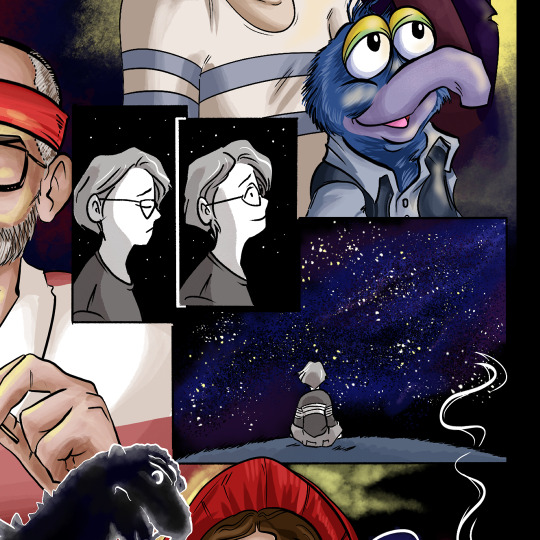
Jessie Gender puts out nothing but bangers, her absolute unit of a video about Star Wars might be my new favorite thing ever, but none of her work hit so profoundly in 2023 than the two-parter "The Myth of 'Male Socialization'" and "The Trauma of Masculinity." There's so much about modern life that isolates and traumatizes us, and so much of it is just shrugged off as "normal." We owe it to ourselves to see the world in more vivid a color palette than we're initially given.
Panels drawn after Kate Beaton and "Ducks: Two Years in the Oil Sands."

"This is Not a Video Essay" is one of the most intense and beautiful pieces of art I've ever put into my eyeballs. Why do we create? What drives us to connect?
I don't even know what else to say about the Leftist Cooks' work, it repeatedly transcends the medium and platform. Watch every single one of their videos, but especially this one.
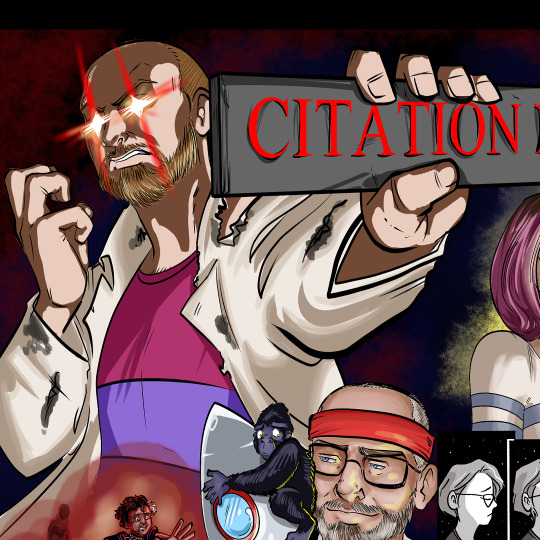
The likelihood you are terminally online and yet haven't heard of Hbomberguy's yearly forrays into destroying the careers of awful people is pretty slim. Just because it has millions of views doesn't mean that Hbomberguy's "Plagiarism and You(Tube)" isn't worth the hype. Too long? Shut up, it has chapters and YouTube holds your place, anyway. You think a deep dive into a handful of creators is only meaningless drama? Well, you're wrong, you wrong-opinion-haver. Plagiarism is an *everyone* problem because of the actual harm it creates--the history it erases, the labor it devalues, the art it marginalizes--which you would know if you watched "Plagiarism and You(Tube)".
Watch. The damn. Video.
In fact, watch all of them!
Thanks for reading this if you did.
#fanart#digital art#caricature#kate beaton#ducks#stranger things#apes#youtube#2023#best of 2023#video essay#hbomberguy#leftist cooks#cj the x#big joel#jessie gender#folding ideas#dan olson#jessie earl#neil and sarah#fd signifier#f.d. signifier#little joel#gojira#godzilla#philosophy tube#abigail thorn#caelan conrad#patricia taxxon#defunctland
1K notes
·
View notes
Text
too often I think we view a "Story" as a "Lecture" (often aided and abetted by authors who conflate the two). I'm not sure exactly how to put this but I observe it in so many classics--not to mention modern works. It seems there will be endless intepretations of what the author of a work is trying to "Teach" us instead of considering what story they are telling us. (And yes, perhaps some of this is coming to mind because I just completed Tolkien's translation of Beowulf and his commentaries, in which he objected to certain moralistic emendations to the original text by other authors, even those closely contemporaneous to the mysterious "author" of Beowulf).
Now, I think there is a lot to learn from a good Story, but not always (not often) because the author is setting out "Lessons." For example, there are many things to "learn" from Pride and Prejudice, and I would say that some of the areas covered are right & wrong, manners & rudeness, human whims and inconsistencies (to quote Lizzy herself). But the "Story" (despite it being the genesis of many romantic "Tropes") is really about the individual characters that Austen created for that story and that story alone. You can't, and shouldn't, necessarily relate to them exactly, or be able to trace a pattern of Proper Conduct from following or opposing their examples as if they were how-to guides for romance, wealth, decorum, life. They are also, if we separate ourselves from our familiarity with the text, not predictable. Darcy proposed to Elizabeth the second time, not becuase it was the right thing to do, or the only thing to do (indeed, Elizabeth thinks he won't because "men don't"). Darcy proposed again because he was Darcy--and he, Darcy, loved Elizabeth. Likewise, we watch Elizabeth react to her circumstances with both good and bad choices, but the point is not that each choice was prescribed to make a moral stand, or teach us how to act in our own lifes. Rather, her choices made sense for her character, the character we've been shown living and breathing on the page. Just becaues we've derived tropes, patterns, and even moral lessons from a great work like P&P doesn't mean there is such rigidity and unformity in the text. It's a great work in part because it does not follow one single formula.
As a contrast, one of my greatest frustrations with Little Women is how often it feels that Alcott is fighting her story by shoe-horning in moral lessons that she feels it is necessary for the audience to derive. She even explicitly breaks the fourth wall (if you want to call it that) to deliver the occasional lecture to her reader on how to behave. When the girls make mistakes in adolescence or adulthood, the lens is almost always pulled back so that the author can show how they erred, and spell out how they will be punished for their missteps. Personally, I find this approach to have a detrimental effect on art. While I believe that art can and should assist in the formation of our characters, if it is hamstrung from the start by its many Morals and Lessons, it will ultimately fail to inspire me.
#i think c.s. lewis falls in the alcott trap too sometimes#whereas tolkien doesn't#when dickens doesn't he makes his best work#when he does it's odiously false because he had no leg to stand on from a moral perspective lol#eliot is often grappling with where she wants to land but she (in my view) had greater genius than alcott so her work is less blemished#my meta#anyway i'm just thinking out loud since i've read works by most of these authors recently#on writing#2025 reads#my reading#little women#pride and prejudice#beowulf#j.r.r. tolkien
11 notes
·
View notes
Note
saw that you finished twin peaks! do you have any thoughts you'd like to share? also, if you haven't already, i high reccomend watching fire walk with me!
ya i saw fwwm after season 2 and before 'the return'. honestly i think my twin peaks opinions are fairly unpopular bc i simply cannot read the series in any way besides as being deeply conservative lol. this becomes especially clear to me in 'the return', which is largely motivated by a narrative of the loss of american innocence (the double r subplot, the numerous instances of drugs and violence tearing nuclear families apart, the encroachment of electricity and processed snack foods and gambling, &c). but this viewpoint is seeded too throughout the first season-and-change of the original series, and fwwm; because what was laura palmer if not the series's first use of rape as metonymous for what lynch sees as a broader process of social breakdown and irreversible change? i understand that some people try to read bob and laura as a critique of the family, in the sense that the violence comes through the father, but i don't think this reading holds even in the original series and it certainly doesn't after part 8 of 'the return', in which bob is explicitly and directly invoked in reference to the bombing of hiroshima and nagasaki, here construed as an originary act of american evil.
i think in david lynch's mind, the spiritual forces and influences in the show are literal and apolitical, and frequently he seems to mean to depict them more as sources of artistic inspiration than anything else ('twin peaks' is in many ways a tv show about making a tv show, hence the double use of electricity throughout 'the return' and fwwm, in particular). but i find this really irritating frankly, because it's at best ignorant of the inherently political nature of the constructions of small-town americana, teenage innocence, violence as an act of moral corruption, and so forth—and also because, after the return, it's simply impossible to deny that the show's overarching narrative IS plugged in to political and historical lines of critique. like, i am not trying to 'force' a reading that deals with us imperialism—lynch put the show on this discursive terrain explicitly and deliberately, through not just the bomb footage and the penderecki threnody but also the inversion of classic symbols of american 'greatness' (the unlucky penny, the evil lincoln impersonator), culminating again in the violation of a young girl's body by the forces of evil. what this all adds up to is the invocation of american empire as a kind of universal moral struggle, stripped of its historical specificity or even the barest pretense of material critique or commentary. if it sounds like i'm asking too much of network television... i mean, maybe i am, but again, these were deliberate choices lynch made and specific historical events he invoked on purpose, lol. see also the jacoby trump commentary in 'the return' (cringe and yawn).
i'm not a lynch scholar but i do think there's a tension throughout his work (what i've seen) between the desire to make art about what he sees as the purely spiritual process of making art (heavily informed by his own TM beliefs), and the conservative elements that creep in anyway, noticeable especially in his commentary on american history, corruption, modernity, &c. the idea of any pure, transcendent, apolitical spiritual dimension of human existence is itself, i would argue, at best a misguided conservative fantasy, and 'twin peaks' ultimately shows these cracks more blatantly than some of his other work (say, 'inland empire') because it tries to subordinate the material to the spiritual in a kind of fantastical historical parable. but, you can see this recurring tension throughout his filmography, eg, the loss of small-town innocence ('blue velvet') and a kind of generalised modernity anxiety ('eraserhead', though taken on its own this one would permit other readings depending on how you interpreted the role of german expressionism in it).
i don't think lynch is an ideologue or even considers himself particularly political, but nevertheless his narratives do idealise a certain conservative vision of post-war america, mourn its loss, and wax nostalgic for its perceived ethos (& it's not a coincidence lynch is/has been a reaganite, lol). anyway, i thought 'twin peaks' had some really incredible moments of visual artistry (part 8 of 'the return', for example!) and i found much of it frankly beautiful and compelling to watch. so, i don't mean any of this to dismiss lynch as a filmmaker—he is, if nothing else, highly technically adept. unfortunately i did just really hate most of what the series was actually saying, lmao.
86 notes
·
View notes
Text
🔥 Mary Shelley: The Original Rebel 🔥
Long before feminism had a name or anarchism was a movement, Mary Shelley embodied both—an icon for every woman and free thinker who ever dared to break the rules. 🌑 This is the story of how a young woman defied societal expectations, created a genre, and dared to ask questions that still haunt us today.
✒️ 1. Author of Frankenstein at Age 18
Let’s start with the fact that Mary Shelley was just 18 years old when she conceived Frankenstein, a novel that would go on to define an entire genre. Not only did she create what we now recognize as science fiction, but she also wrote a story that questioned the very nature of creation, power, and responsibility. Her story posed radical questions about science and society that were way ahead of her time—questions we’re still grappling with today.
"I had worked hard for nearly two years, for the sole purpose of infusing life into an inanimate body." — Frankenstein
Mary didn’t just write a novel; she opened a door into the philosophical realm where science, ethics, and humanity collide. To create that kind of work at such a young age? Iconic.
🌹 2. A Voice for Women in a Time of Silence
As the daughter of feminist Mary Wollstonecraft and anarchist philosopher William Godwin, Mary was raised with a rebellious streak. But make no mistake, she wasn't just following in her parents' footsteps—she forged her own path in a society that stifled female voices. At a time when women were largely excluded from intellectual life, Mary created a groundbreaking work of literature that dealt with the raw power of creation, reflecting a woman's complex relationship with the act of creation itself.
Frankenstein can be read as a feminist text—an exploration of the consequences of unchecked male ambition. As Victor Frankenstein rejects his own creation, we see Mary’s commentary on a society that sidelines women’s creative contributions and responsibilities, while glorifying male “genius.” Her work showed that women could be thinkers, writers, and philosophers just as much as men, a radical notion in the early 19th century.
⚡ 3. Rebellion Against the Status Quo
Mary’s life itself was a form of resistance. She fell in love with Percy Bysshe Shelley, a married poet, and scandalized society by eloping with him. This choice meant financial hardship, societal rejection, and emotional turmoil. Yet, through it all, she refused to conform. She traveled, wrote, and remained unapologetically herself.
Her life and her work became a testament to individualism and nonconformity, values cherished by anarchists and free-thinkers alike. By pursuing love, art, and intellectual freedom, Mary showed that one could live authentically without bending to society’s judgment.
🧩 4. A Prophet of the Dangers of Authority
In Frankenstein, Mary exposes the hubris of those in power who think they can control life and death without consequence. She depicts Victor Frankenstein as a cautionary figure—a “creator” whose ambition and ego lead him to transgress natural boundaries, abandoning his “creation” and ultimately causing chaos. In this, we see Mary’s prescient warning about the dangers of authority and the consequences of those who wield power without accountability.
Her warnings apply not only to scientists but to any authority that tries to dominate, exploit, or “create” without considering the human cost. This is anarchist thought in its essence—challenging unchecked power and advocating for responsibility and freedom.
🥀 5. Legacy of Resilience and Creative Defiance
Despite incredible hardships—losing loved ones, facing financial insecurity, and navigating a patriarchal world—Mary never stopped writing. She edited Percy’s works after his death, making sure his legacy lived on, and continued to publish her own. Her resilience made her a symbol for artists, women, and radicals alike.
Today, Mary Shelley remains a figure for anyone who has ever felt out of place in a society that demands conformity. She’s an icon for every woman, every anarchist, and every creative mind that has dared to imagine something different, something better.
With Frankenstein, Mary Shelley didn’t just create a monster—she created a legacy of rebellion, resilience, and radical thought. She paved the way for generations of women writers, thinkers, and rebels who followed. In her courage to live and write by her own rules, Mary remains a reminder that true art and real change often come from those who refuse to play by the book.
📚 6. Iconic Reads for the Radical Spirit
"Frankenstein" – Shelley’s groundbreaking novel on humanity, rebellion, and the limits of science—an essential read.
"The Last Man" – Shelley’s lesser-known but powerful work on isolation, freedom, and survival.
"Mary Shelley: Her Life, Her Fiction, Her Monsters" by Anne K. Mellor – A modern look at Shelley’s legacy, philosophy, and radical ideas.
3 notes
·
View notes
Note
💔 heart break headcanon
I sat with this ask for quite a few days now. I thought it over whenever I went into my daydream world. I had about fifty ideas come and go but none stuck like I wanted.
Until tonight thanks to this picture of Andrew:
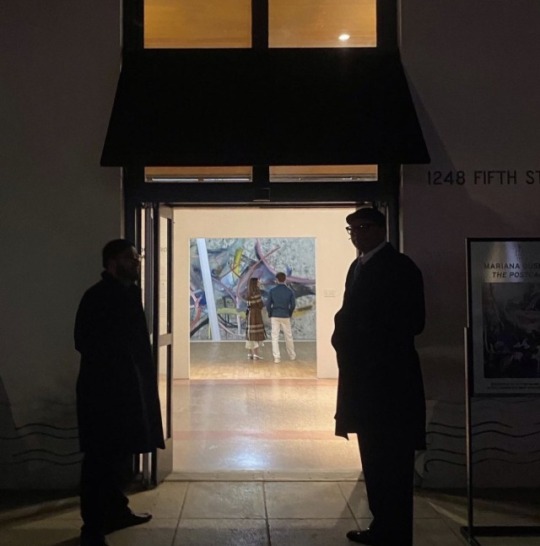
Time for some modern day, superhero Romeo and Juliet.
Let's do this!
Wilson Fisk, New York City's most powerful businessman, infamous crime lord, one of the most feared men in the state, mayor of the city...or as you like to call him...dad. He has his hands in every inch of this city and puppets it to his will. His extensive wealth is spent on spoiling his wife (your mother), Vanessa, and his only child (you). His businesses activities were not exactly something that was hidden from you. Both parents made it clear that danger followed your father wherever he went. You knew he was into shady business. One doesn't get power and wealth like he has without stepping on people on the way up the ladder.
Your life was spent inside a protective bubble. Privacy was not something you were used to. Armed guards followed you wherever you went, your internet activity was heavily monitored, and you were never allowed to have friends.
Your childhood was spent by your mother's side instead. She home schooled you, took you to museums, and gave you as much knowledge about the world as she could. She instilled her love and appreciation for art into you at a young age. Lucky for you, the city was crawling with art museums. The first place you were ever allowed to go alone (as alone as you could get with two body guards trailing behind you) was to The Metropolitan Museum of Art. It became one of your favorite places. Your happy place.
On this particular evening, you were wondering through the MET, making a straight line towards one of your favorite pieces of art work. Tonight, there was a young man standing in front of it. You pushed up beside him to admire the work together, craving any kind of human interaction you could get.
"Isn't it beautiful?" You asked him. "The Dissolute Household. Jan Steen is the master of creating the perfect depiction of domestic chaos."
The man turned his head to look at you with curiosity. His face was scruffed with stubble like he'd forgotten to shave this past week. He wore a red beanie to hide the overgrown, greasy hair poking out from under the brim. Dark bags deepened his bright brown eyes. He seemed to take in your outfit in comparison to his own. You were well dressed and put together, perfect posture, not a single hair out of place. The epitome of wealth and class. Meanwhile he looked like he shuffled in from an overnight bender and couldn't remember how he ended up in the museum but was just going with the flow to not draw attention to himself.
He gave you a weary smile, "I wasn't sure why I stopped at this one but I found it hard to look away."
"Steen is good at holding the observer's attention because there is so much to look at. That's him, in the painting, and his wife. It depicts a variety of sinful acts happening. He's lacing fingers with the maid behind his wife's back, his wife is clearly intoxicated, a bible is being trampled on the ground, there's broken bottles and food strewn about, someone is warding off the beggar at the door. Chaos and merriment all around. And above all of them hangs a literal basket full of future misfortune like a terrible fate hovering over their heads. The items in the basket promise poverty, disease, and bad luck. Steen enjoyed painting commentary into his work. Everyone always looks so happy amongst the chaos even with the darkness of reality hanging above them."
You never had chaos in your life. Everything was controlled and quiet.
The craziest thing to happen to you was when you were 13 and your mother woke you from a sound sleep. The two of you had to evacuate the house into a private helicopter and be flown to the airport. You heard shooting happening in the hallway as you ran but you never actually saw where it was coming from. The two of you then spent the next year in a beautiful home in Sicily. When you were finally able to return back to the city, your father had set up new, stricter measures of security. No one ever told you what happened that day and that kind of thing never happened again. Despite being terrified in the moment, it was the most excitement you'd ever experienced in your entire lifetime. Sometimes you longed to feel that again.
"I never really looked at art too deeply before," the man mumbled. He was quiet, speaking as if he was in a library, afraid to be scolded by a rude librarian. "At least not paintings. I'm more of a photography kind of guy."
Whoever he was, he was attractive in his own grimy kind of way. You found yourself wanting to lean in closer to hang onto every word he spoke. You'd never had a boyfriend before. Once you flirted with one of the younger guards assigned to you. You hooked up with him in a coat closet at a fancy party. That was your first and only time being intimate with someone. When your father found out, that guard disappeared from your life. You liked to pretend that he was just let go and fired but you knew the darker truth. That man was no longer alive.
You wanted to know this new stranger even with the threat of death hanging over his head. You needed excitement. You craved the idea of having someone to love. So, you introduced yourself. First name only. Last name's were off limits. He smiled. It was a nice smile. And told you his name was Peter.
The two of you spent the rest of the evening wondering around the museum together. You insisted on showing him all your favorite works. He would listen intently, like he really cared what you had to say, while you over explained every little bit of knowledge you had on each piece. You could tell he was hyper aware of the two men following behind you everywhere you went. Even if they were dressed in civilian clothes, it was obvious they stood out as your personal bodyguards. It was even more obvious when you leaned in extra close to Peter while he unleashed his own knowledge about a particular old photograph you two were staring at and a gruff, pointed cough echoed out behind you, making you immediately jerk back and take a step away from your new friend. They may be here to keep you safe and out of trouble but they were loyal to your father, not to you.
Before you left for the night, you made plans to meet Peter back at the museum next weekend. He asked for your number but you refused to give it to him. Not yet. If you wanted to see him again, you would have to do it carefully. Slowly.
It took two months of weekend museum visits before you worked up the courage to tell your mother about him. You were certain that the guards assigned to you had already informed your father you were meeting a friend every Saturday night. You wouldn't be surprised if he had full intel on every detail about Peter Parker's life neatly stacked into a binder in his office. No one mentioned it to you though so you never brought it up. Until now.
Peter had asked you out to dinner. Up to this point, the two of you had never left the MET property. That was your safe place but you both wanted more.
Bringing up the idea of dating had to be run by your mother first. She was the more reasonable of your parents. She valued romance, loyalty, and love. If anyone could help get your father on your side, it would be her.
It was over dinner in your shared penthouse apartment that you brought it up. Just the two of you...and the security standing outside the room.
"How did you and daddy meet?" You asked, keeping your tone casual.
Vanessa smiled at the memory, "You know this story all too well. I used to tell it you as a bedtime tale when you were a girl."
"I know but I want to hear it again."
"He wandered into my gallery one night. He was very entranced by a particular painting I was trying to sell. The one hanging up in our bedroom. Rabbit in a Snowstorm. I found him standing in front of it, quietly taking it in, and I knew I needed to know more about him. It takes a certain kind of man to appreciate a painting like that."
Funny how her story mirrored so similarly to your own. You pushed your food around your plate with the end of your fork as you hesitantly brought it up, "I met someone. At the museum. He was standing in front of one of my favorite paintings. We got to talking and next thing I know, we've explored the entire building. Head to toe. Every inch of of the place. He seems like an amazing person, mom. He loves listening to me talk about art and I love hearing him explain all the details of photography. I feel like we're on the same wavelength. I want to see more of him. He asked me out to dinner but I told him I would get back to him. You know how daddy can get..."
Vanessa sighed, studying your face and seeing a lovestruck, desperate look gazing back at her. You could tell you won her over with the story of your first meeting. She knew you were in your twenties and never had a chance to date before. You couldn't stay locked in your tower forever. "What's this man's name?" She asked.
"Peter. Peter Parker. He lives in Queens with his aunt. He's been helping take care of her ever since her husband died a bunch of years ago. He's compassionate and kind. He cares about other people. He had a really good heart, I can see it. Please, can you talk to daddy about it. I can't stand the thought of trying to get close to someone only for him to hurt them. I can't let him hurt Peter for being interested in me. That's not fair. I really want this to work out. Please, pretty please, will you talk to him."
And she did. With his begrudging blessing, you were allowed to date Peter.
Peter knew limited details about your life. He didn't know who your parents were or your last name. He just knew that you were the daughter of someone important and that you two needed to be careful. Strangely, he took it all in stride. He never seemed nervous by the fact he was always surrounded by loaded guns or constantly being watched. The potential danger hanging over his head never once phased him. You weren't sure if he was naïvely stupid or just really brave. You liked to think that he didn't care as long it meant he got to stick around you.
He was definitely in a different social class from your family. Peter didn't grow up with wealth. He'd never even left the state of New York before. That shocked you. Your mother and you loved to travel.
You upper class lifestyle was probably the only thing that ever shook him. He seemed to fidget and get uncomfortable the more fancy, high end places you brought him to. He preferred things to be more low key. You'd never stepped foot inside a McDonald's until he brought you there after a date to get McFlurrys. It was surprisingly delicious even if the floors stuck to the bottom of your feet as you walked.
The longer you two spent together, the more you fell in love.
Six months in, you decided it was the right time to tell him more about your life. You were sitting on a bench in the middle of central park. You liked this spot because the men following you had to stand further away and it put you two out of their direct ear shot.
Peter held your hand, his thumb brushing over your palm. You laced your fingers through his.
"I have something to tell you," you both spoke at the exact same time.
After a pause, the two of you broke into laughter.
"You go first," he offered. "Mine can wait."
"Did I ever tell you who my father is?" You knew the answer was no but you asked anyway.
He shook his head and shrugged, "I figured he was probably some politician or something. Someone important. That's why you always those guys following you. They keep you safe so that makes them alright in my book."
You nodded, "Yeah, I guess so. It sucks having them around but I guess they're useful if shit goes south. My dad is Wilson Fisk, you know, the big, giant business man and current mayor of the city. That's why those guys are always around. I thought it was probably time you knew since he invited you to attend our family dinner this weekend. He wants to meet the man I've been spending all my time with."
Peter tensed. He tried to play it off like he wasn't bothered but you noticed. His shoulders hunched and his back stiffened. You watched his jaw clench together and quickly loosen again as he forced a smile.
"Mayor Fisk, huh? He's your father? I didn't even know he had children." His voice was strained.
You slowly nodded, carefully taking your hand out of his grasp to place in your lap, you didn't like the reaction he was giving you. Something was wrong. You glanced over your shoulder to the guards a few few feet away just in case you need their help. "...Just one kid. Me. He likes to keep his family separate from his work and the public eye. There are bad people in the world who want to hurt him so he keeps my mom and I off the television and news as much as he can."
Peter chewed on the inside of his cheek. His shoulders still hadn't relaxed and he refused to look at you. "Why didn't you tell me this sooner?"
"Tell you what? That my dad was the mayor? What does it matter to you? It's not something I go shouting off the rooftops. It's not a big deal. I'm not the mayor. He is."
"Not a big deal?" He gave a stiff, dry laugh. "Do you have any idea the kinds of things that man has done? Your father has caused me-" He cut himself off with a heated grunt of annoyance.
Your brow furrowed and you leaned away from him, "What are you talking about, Peter? Why do you have anything to do with my dad?"
He opened his mouth to speak but closed it again, obviously thinking better of whatever he was planning on saying.
Tears welled up in your eyes at his reaction. You expected him to be mildly shocked or maybe even nervous about having dinner with the mayor but you didn't expect him to get angry as if he had a personal vendetta against your father. Even if he wasn't shouting at you, you knew what silent anger looked like. He was fuming.
"I don't know if I can do this," he huffed, still refusing to look in your direction.
You gave a soft gasp of shock, "What are you talking about? What are you saying?"
"I'm-" he glanced back at the the men who were still oblivious to the conversation being had. "I can't. I don't want to be associated with anyone who ties themselves with Fisk."
"Associated?" You voice heightened, causing your security team to take an interest in what was going on. You quickly lowered your voice again to ward them off. "The only way I'm associated with my father is when we have the occasional family dinner when he can spare the time."
Peter scoffed, "Yeah, right. You'd have to be stupid to not have any idea what shady shit he gets up to? Human trafficking? Drug trafficking? Weapon trafficking? Murder? Anything illegal, take your pick, and Fisk has his hands over it."
This was news to you. You assumed he got his wealth through shady business deals and backstabbing his opponents. You knew he had hit men who would kill for him if he asked them to. Maybe you just never wanted to think too deep about it. Your silence was all Peter needed.
"I'm sorry," he whispered. "I just can't."
He got up and walked away, leaving you silently crying on the park bench.
You made up an excuse for why Peter couldn't attend dinner with your family. You smiled and kept the sadness out of your face. Even though he hurt you, you knew what crying to your father would mean. Your heartbreak wasn't enough to risk his life over. You weren't your dad. Revenge and violence wasn't in your blood.
And maybe Peter was right. As you sat across from your dad at the table, you couldn't help but wonder how the rest of the world saw him. You wondered if your mother knew. She had to. They were in this together. You felt like a stranger in your own home. These people you knew all your life were no longer covered by their masks.
A week passed before Peter found you again. It was late at night. You were in your bedroom when there was a knock on the balcony door. That was unusual due to the fact that you were over 50 stories in the air and the balcony had no other entrance besides your bedroom.
You looked over, the bright lights of your room making it impossible to see out into the blackened night. You slowly stood up from your desk, your heart racing, as you grabbed a pocket knife from your drawer. You couldn't see anyone out there. It might have been a bird attempting to fly in the dark. You unlocked the door and stepped out into the crisp night air with your knife held at the ready.
There was no one.
You were alone. Your arm slumped back to your side, the knife loosening in your hand. Just as you were about to turn around to go back inside, chalking it up to your sleep deprivation, the presence of a body lowering behind you made you jump. Before you could let out a piercing scream to alert the guards, a heavy gloved hand clamped over your mouth. This was it. This was how you die.
You struggled against the mass pining your arms down but it was solid. You were no match for the intruder. A hushed voice whispered in your ear.
"I'm not going to hurt you," he hissed. "Stop struggling and I'll let you go. By the time you scream, I'll already be two blocks away so I'd rather you not try it. I'm here to talk."
It was Peter's voice. You had no idea how he got up here, your mind was going a million miles an hour, and you nodded. His grip around you loosened and you pulled away, whipping around to face him. Except that you weren't face to face with the Peter you knew. The sight of Spider-Man standing before you made you almost scream but you quickly clamped your hand over your mouth.
"Wha-" you stuttered out. "Peter?"
"Can I trust you?" He asked.
You weren't sure. If there was on thing your father hated, it was vigilantes. He'd go on long rants over his hatred of people like Spider-Man and Daredevil. They were the bane of his existence, always throwing a wrench in his plans.
The more you thought it, the more obvious it was that he wasn't a good man.
You nodded, making up your mind then and there, "Yes. I won't tell a soul."
That night Peter revealed his truth. It was a hard pill to swallow. The poor, disheveled man from Queens, your first love, was your father's sworn enemy.
You had many doubts. There was no way those two men could ever be put into the same room with each. Your family and Peter could never mix. You two stood on opposite ends of the equation.
But you didn't want to give him up.
And he felt the same.
The relationship progressed as normal and you vowed to stay out of whatever your father or Spider-Man had going on. That was not your concern. Peter wouldn't ask about him and you wouldn't ask about Spider-Man.
But that knowledge always hovered over your heads. Once the truth was out, there was no way to reverse what you knew.
You were the key to tipping the scales. You could destroy Peter Parker and Spider-Man by snitching to your father. Or you could destroy your family by feeding Peter private information.
There was only so long you two could pretend to ignore the obvious.
A time would come when you would have to chose between love or family. There could only be one winner in the battle between good and evil.
And, which ever way the scales tipped, a piece of your heart would be ripped out and buried alongside the loser.
AND I'M GOING TO STOP IT HERE because it's getting too long for something that was supposed to be simple headcanons. I'm very sleepy and have not proof read my mad ramblings so please excuse any forgotten words or mistakes. I'm tired old lady just trying to do my best.
#the amazing spiderman#tasm#peter parker#tasm peter parker#andrew garfield#tasm peter#tasm peter parker x reader#tasm x reader#tasm peter x reader#peter parker x reader#spiderman#spiderman x reader#spiderman headcanon#tasm headcanon#tasm imagine#spiderman imagine#peter parker imagine#tasm peter imagine#ask game
88 notes
·
View notes
Text

inarticulateimbecile (@inarticulateimbecile)! Ole buddy ole pal! They are such a sweet lovely human and I adore them! Their art first drew me in, and I've been a fan since I saw the first one. (And they very kindly let me fawn at them in their DMs about them haha!) I love how much character their work has. (Best of all, how ugly-sexy Severus is; exactly as he should be!) Their work has such incredible detail, gorgeous coloring, and it forever strikes me through the heart. I get all of the feels! I don't feel art-smart enough to leave proper commentary, but I sure try for them!
Not to mention, they leave the most generous and thoughtful comments! I swear, I cry whenever they leave me a new one. They are so perceptive and they connect with every intention and all of the same details I'm so passionate about! We had good long chats about Contempt, and our love for Severus Snape (and how we love him!) They also very kindly gifted me art for Contempt, too! You can see it at the bottom of the fic itself here, or in the raving Tumblr post I made here. (That also made me cry.) (I'm a crier, what can I say?)
Not to mention on top of being such a fabulous artist and passionate fan, they are also a remarkable writer???? Their fics blew my socks off, I swear.
Anyway, inarticulateimbecile is pretty much a rockstar and you should definitely check out their work!
Art:
Ivy (Snarry)
threats of bodily harm (Snarry)
Embers (Severus)
Addiction (Severus)
Stuck (Severus)
Fics:
Hypothermia
Harry/Severus. Rated: M. Words: 19,582. Abuse. Unhealthy relationships. Forced kiss. No smut. Alcohol abuse. Angst. Snarry Adopt-a-Prompt.
Prompt #4: Sirius isn’t quite right when Harry goes to live with him. No one believes Harry, since Sirius acts fine when other people are around. No one, except for Snape.
Post Mortem
Harry/Severus. Rated: E. Words: 17,343. Reluctantly falling in love. Character study. Mild dub-con. Hogwarts 8th year. New fave!!
A tale of hero worship and failing to pretend.

for an explanation about Mutuals March, or to figure out why i wrote you a thing, please check out this post.
41 notes
·
View notes
Text
control (2019) review
alright! i now have 45 hours in control and have beat the main game, both big dlc quests, and the vast majority of the other sidequests (except shüm fuck shüm). so let me share my updated thoughts!
short answer: it’s really good 👍
longer answer:
control is a weird one. while it is technically true that i've never played another game like it (i have never played a third person shooter before!), it also takes much of its inspiration from stories, art, tropes, and aesthetics with which i am extremely familiar. of course, that isn’t a bad thing in and of itself. but it did kind of add to my lukewarm feelings about it in the first couple hours. there is very little in control (at least in its beginning) that legitimately surprised me, which somewhat contrasts the ~deep, dark, mysterious, twists around every corner~ vibe it’s trying to cultivate. but i absolutely warmed up to it.
while i’m talking about the beginning and my hesitation surrounding this game, i should probably bring up my only major grievance with control: the way jesse is written. i’ve joked many times that cutting 80% of jesse’s inner monologue would make control a far better game. the thing about jesse is that she is very invested in her own role as Mysterious Protagonist With Dark Past. i cannot emphasize enough that the worst way to make a character feel Mysterious (in a non-comedic work, at least) is to have them think to themself about how mysterious they are and how they have to avoid telling people about their backstory and etc etc. the opening ten minutes of the game actively made me want to know less about jesse. i did not care about her backstory until maybe halfway through.
she also keeps a running internal commentary throughout the game that i think is written to make her feel “relatable” ( “ugh, i have to go do more tasks?” “i kind of hate that guy” sorta stuff) but instead feels tell-not-show-y as hell and also just plain obnoxious. writers have GOT to understand that in a visual medium, giving a character an inner monologue and/or running commentary is going to make them look like a dork. hades understands this. psychonauts understands this. hell, death note understands this best of all. i do not believe jesse is a dork. i think she’s supposed to be cool as hell. and she is! i just wish she were a little less Aggressively Normal. (though, to be completely fair, it is cool to have an AAA video game with a female protag who’s extremely normal.)
well, with that out of the way, let’s talk about some of the other stuff in this game.
on the topic of characters, i surprised myself with how much i liked a lot of the characters here. the animations are a little uncanny but the voice acting is just top-notch. honestly i cannot pick a favorite (human) character; they’re all really fun, and i came to really look forward to talking with them. (oh except trench. did not like watching his hotline things. he has the same problem as jesse: the narrative thinks he is too Cool.) i think emily pope, casper darling, and langston all really nail the “cool but also dorky” vibe in a way that jesse, alas, does not. speaking of dr. darling, i loved the decision to keep his involvement in the plot to the backstory, and have him only “speak” to jesse through prerecorded messages. (live-action messages too! how cool!) unraveling his entire deal was one of my favorite parts of the story.
goes without saying that ahti, the quirky janitor, is GREAT. what an excellent character. “finnish tango” is my favorite section of the main plot (along with ashtray maze directly after it, of course).
well, that is a perfect segue into talking about the main plot. i think it’s fine. idk. no strong feelings. the hiss are a fun antagonist. dylan’s interesting. there are some parts of the ending i don’t entirely understand but that’s all cool. yeah idk! i can’t say i was really playing the game to see what happened next in the main storyline. but i also don’t really have any complaints about it, other than wondering if i would have been more invested if jesse’s backstory had revealed itself more quietly & naturally.
meanwhile, the way control uses environmental storytelling is top fucking notch. oh my god. i LOVED collecting documents. hooooooly shit guys this is such a good game if you want hundreds of irrelevant documents. there is lore about EVERYTHING. some of it is important to the main story. the vast majority is not. you gotta sift through it and piece stuff together. there’s a lot of stuff that’s just there to make the world a little richer. and the overwhelming bureaucracy of the bureau really makes me believe that they would have vast amounts of documents describing all of it.
in general, the stuff about the FBC and the oldest house is where the story really shines. it’s equal parts fucked up government agency & group of people who is actually doing important work. (well, maybe with an emphasis on the former. though i kind of wish there was more direct political commentary in the game...) i loved the unethical science, and all the disagreements about scientific method (hi underhill), and just the vast amount of history everywhere.
it helps that the number one appeal of control is its environments. obviously the game is gorgeous. i love its sinister brutalism, its use of color and light, the surrealist parts, just everything. it’s one of those games that well-balances realism with having a striking artstyle. but, of course, one of the biggest delights in control is how tactile the environment is as well. the part where i started liking the game was when i got the launch ability and could interact with just about anything. and then i started REALLY liking the game when i got to the maintenance sector and saw just how serious the worldbuilding was. not only are practical concerns like “how does the FBC process energy” taken into account, those questions also form the basis for hugely complex rooms with an insane attention to detail. goddamn.
ok well with the launch ability i suppose i should talk about the gameplay too. it’s very fun! since i was playing on controller, i wasn’t a massive fan of the shooter parts, but as soon as i got an ability that locked onto targets it was like yes. this will be my primary weapon for the rest of the game. and it was. (also the gun pierce. i love you pierce.) the movement is also great. and the other abilities. seize! is really fun! and it is so awesome to fight in environments where you have to take the environment into account even more than usual, since you’re launching stuff all over the place!
(edit: i have just now remembered one more thing i really didn’t like about the game: the obnoxious quest ui that just stays on the screen! i am a seasoned player of video games; i can tell what i need to do next without having a big message on screen at all times. and if i can’t, that’s what the missions menu in the pause screen is for! i turned off that ui very early on and completely forgot about it.)
i think the sign of a great game to me is one that makes you want to do the sidequests. boy i wanted to do the sidequests. i wanted to discover shit! i wanted to do all the fetchquests! i didn’t care at all about the rewards! the whole mold thing was an especially fun & challenging part, and i really liked confronting silly altered items. it’s also an interesting choice to lock many of the major boss fights behind sidequests. i won’t say much about it for spoiler reasons, but hands down my favorite character in the ENTIRE game is former. i love former with my whole heart. oh my god. best beastie in the world. (or, uh, not in the world. idk.)
one thing i will say about the gameplay, though, is that inventory management was a bit tedious. i could not get rid of mods fast enough (and i got so much money from that LOL) and there were so many of them that getting one didn’t feel particularly special. though yes, i did try to pick up every collectible and chest i saw.
finally, about the dlc!
investigations sector felt a little bit like a hamfisted crossover, but other than the alan wake stuff i was pretty into the execution. i really, really enjoyed the stealth sections, and just the general horror throughout.
the foundation is EXCELLENT. i liked the story of the foundation far more than the story of the main game. aesthetically sublime. great lore/backstory that keeps you intrigued but never gives too much away. FORMER IS THERE. contains “found footage,” one of the best short sidequests. there is a secret astral bathroom. it’s great.
overall, control is pretty good. as a story about a fucked up house it very much fits into my realm of interests, and i generally think it’s fun, interesting, and well-polished. i don’t play many AAA games, but wow, you can absolutely see how the big budget helped this one. would recommend.
4 notes
·
View notes
Text
The Short Films of David Lynch 1967-1974
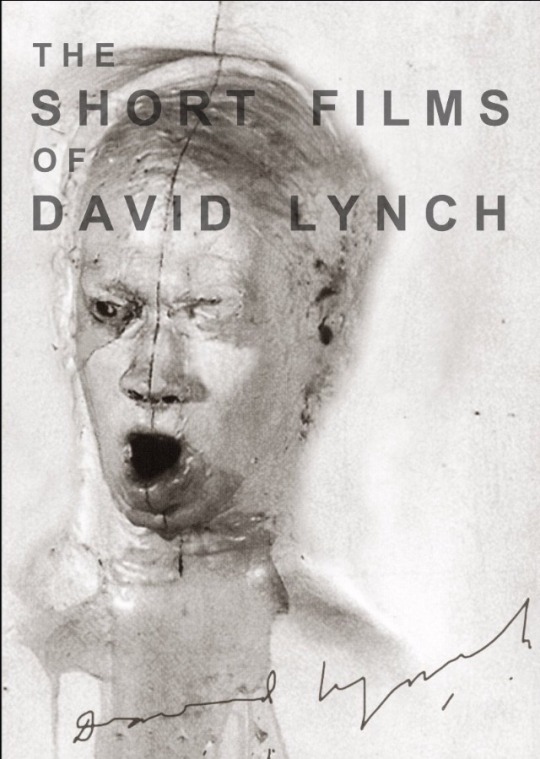
Movies #1,029-1,036 • SHORT FILM MONDAYS
Most, but not all, of these EIGHT shorts are compiled on the 2002 video release. I plan on watching all of the Lynch short films I can find, probably in three chronological installments.
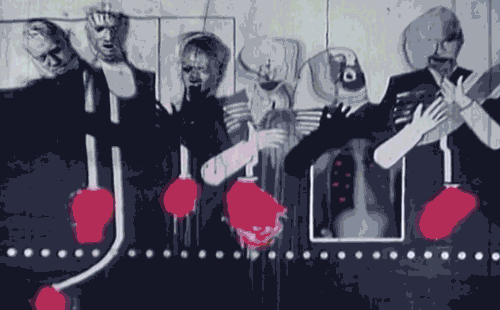
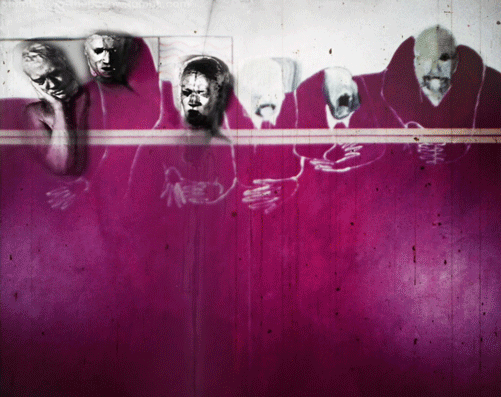
SIX MEN GETTING SICK (SIX TIMES) (1967)
A living painting soundtracked by sirens and other bleeps and bloops. Blasts of color, flashes. Gotta fill them hole sacks, boys! A sudden burst of purple accompanying the vomit. Repeats guess how many times? The repetition seems key, makes it work, as you can pick up on different things each time, like the word "SICK" flashing (didn't catch that until pass #5). Quite the beginning!
SCORE: ⭐️⭐️⭐️⭐️⭐️⭐️⭐️⭐️⭐️⭐️

ABSURD ENCOUNTER WITH FEAR (1967)
Huge menacing movie classical piece (I believe this is György Ligeti? It repeats in other early work, primarily “Early Experiments”) soundtracks man (early collaborator Jack Fisk in Blue Man Group mode) walking through tall grass in an open field by a forest, encounters whiteface Peggy Lynch (David’s first wife, who will be a constant in these shorts as well). She’s crouching, looks scared and undoes his fly and pulls out some dandelions? This is the earliest commentary on #MeToo, perhaps. He gets 'caught' by the camera and faints. Lovely destruction of the film stock here as well.
SCORE: ⭐️⭐️⭐️⭐️⭐️⭐️⭐️⭐️
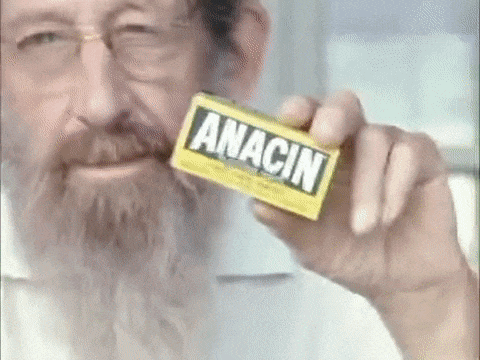
FICTITIOUS ANACIN COMMERCIAL (1967)
Jack Fisk, looking very Amish, gets some aspirin from God.
SCORE: ⭐️⭐️⭐️⭐️⭐️⭐️⭐️
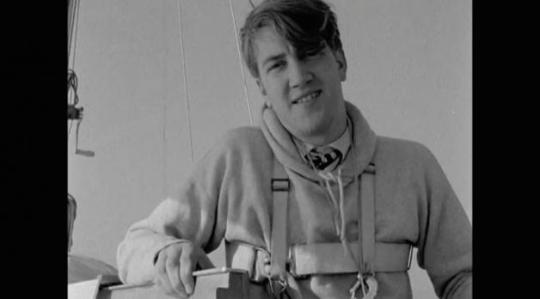
SAILING WITH BUSHNELL KEELER (1967)
An ominous soundtrack replaces native audio of this not-so quaint sailing trip. We see the titular Keeler, his son Dave and a boyish Lynch himself. Things have slowed down. Not your typical day on the boat vibes; what could have been the darkness he was exploring here? Something something capitalism (yachting shit?)? Doubtful. Slow fade to blackness. Nobody knows.
SCORE: ⭐️⭐️⭐️⭐️⭐️⭐️⭐️⭐️
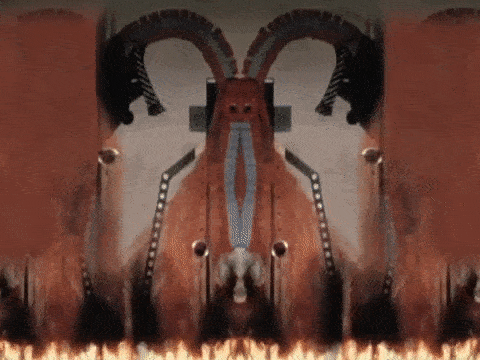
EARLY EXPERIMENTS (1967-1968)
This odds and ends edit came out on DVD in 2002, comprises various things made around the time leading up to The Alphabet. Flashing images, some living art again, kaleidoscope-style. We then see Lynch and he's clearly 'acting' — slowly moving his hands, casting shadows, etc., and this goes on for several minutes
This transitions into a painting with a symmetrical design with fire underneath, utilizing a mirror effect. Then we see Peggy in a rocking chair in black room. She's having some tea. There are jump scares. Jump scares, yes. Lynchian jump scares. She is legit creepy. Green paint on baby doll head. Mirror effect on Peggy in white room to very successful results.
Easily the freakiest thing yet. Really making good use of mirror and other in-camera FX but maybe edited way later?
Back to the symmetrical living art; the fire increases.
We briefly see Lynch behind the camera again, a slower and even more ominous return.
My one issue is maybe the utilization of this music; I think it would make anything you're watching 90% creepier.
Now things have really slowed down, blurry images
Cut to an older actress but same visuals and scenes from Alphabet room and also Peggy is still there.
Return to the living art and the whole painting has changed and we see a demonic figure at center.
More mirrored stuff with Peggy but more cut up with faster edits and we see some geometric design which looks a lot like the floor in the Twin Peaks red room.
Cool effect over the old lady face, drawing on the film strip...

Mirroring a dead insect now...
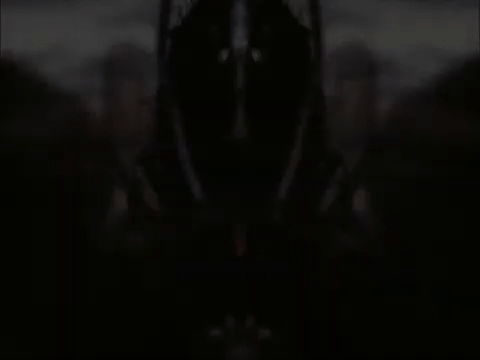
I mean, I could just make gifs out of every part of this. Very giffable shit...
Living painting of a tree on black background. And then it ends.
SCORE: ⭐️⭐️⭐️⭐️⭐️⭐️⭐️⭐️⭐️
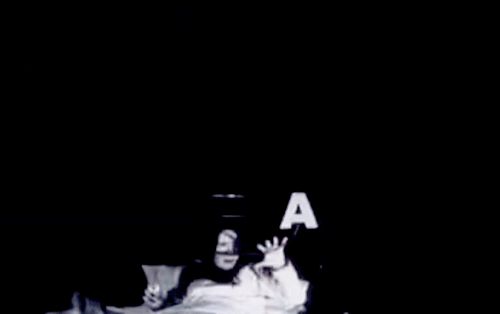
THE ALPHABET (1969)
Probably the best distillation of the early work, condensing all these cool and very weird modes and tricks in a tight four minutes.
SCORE: ⭐️⭐️⭐️⭐️⭐️⭐️⭐️⭐️⭐️⭐️

THE GRANDMOTHER (1970)
The movie that dares to ask, what if humans grew from the ground like trees and barked like demented seals? At over a half hour this is longest standalone short by a wide margin. It employs similar tactics as The Alphabet (a mix of weirdo live action and kooky living page) but with enhanced sound editing (his first collab with the great sound designer Alan Splet) and a more in-depth narrative: a young boy wets the bed and his dad freaks out, slamming him into the wet spot. The mother's not much better, weirdly over affectionate and so naturally this piss kid grows a grandmother from some magical seeds on his bed. But the trouble persists so he becomes part of the Lynchian cut-out art world and murders them…


Then he briefly makes out with plant Grandma before the whole thing descends into some final chaos. This honestly might be the weirdest thing he's beer made and that's saying something!
SCORE: ⭐️⭐️⭐️⭐️⭐️⭐️⭐️⭐️⭐️½

THE AMPUTEE (1974)
The Twin Peaks log lady (Catherine E. Coulson) plays a legless double amputee and she gets her bandaged stumps treated by a male nurse as she narrates a letter she's writing about relationships and people. I really appreciate how everything before was more or less an experiment in the visual and this one — just a single static shot — is experimenting with form. Feels like an important bridge to the future for Lynch.
SCORE: ⭐️⭐️⭐️⭐️⭐️⭐️⭐️⭐️½
Dorothy McGinnis Grandmother Richard White Boy Virginia Maitland Mother Robert Chadwick
#short film#david lynch director#1967#1968#1969#1970#1974#horror#experimental film#peggy lynch#jack fisk#🇺🇸#7#8#10#9#catherine e. coulson#8.5#dorothy mcginnis#richard white#virginia maitland#robert chadwick#9.5
2 notes
·
View notes
Text
65. Gleanings, by Neal Shusterman

Owned: No, library Page count: 426 My summary: The world is run by the Thunderhead, and kept in line by gleanings from Scythes. We’ve seen Scythe Anastasia and Scythe Lucifer’s stories. But what about the other stories we haven’t seen? The past, present, and future of this world - art contests, communities denying the existence of Scythes, a dog’s revenge, tragedy in space. This world is so much bigger than ever before. My rating: 4/5 My commentary:
I didn't know this book existed! It's a further novel in the Arc of a Scythe series; I say novel, it's a collection of short stories set across the timeline of the Arc of a Scythe canon. There's at least one story that takes place just as the Scythedom began, and at least one that takes place after the events of the series. I wasn't entirely sure what I was getting into when I started reading this one (see the fact that I didn't know it existed), but hot damn do I love Neal Shusterman's work, and this certainly did not disappoint.
Standard disclaimer: not talking about all the stories, just the ones that jumped out at me for whatever reason. And the first of those is The Mortal Canvas, featuring an early Scythe coming to an school and challenging four pupils to a contest - create the best art, and gain a year of immunity from gleaning. I'm of two minds about this one. I really liked the view of the early days of this world, where the younger generation have been born into immortality but the older ones still remember fearing death. I just wasn't too sure about the actual art contest element. See, one of the worldbuilding points in Arc of a Scythe is that humanity is just a tiny bit creatively sterile, everything being safe and standardised. This is encapsulated in the students, Wyatt being unable to create art without relying on formula and program, and Morty wanting to create something original. Morty ends up submitting an incredibly provocative oil painting of the Scythe that shocks the onlookers into silence. His is obviously the best art, though Wyatt wins the contest, but I'm not too sure about the messaging going on here. Much is made of the idea that a fear of death and mortality is an impetus for great art, but it smacks of the whole 'if you get help for mental health issues you won't be able to Create' mindset so common in reality. Then again, the issue is less of individual response than collective artistic stagnation - it's not that Wyatt is himself bad for not being able to create, more society's fault for prizing cookie-cutter copies of great art rather than something more creative and challenging. Hmm. I think I just did a 180 in my opinion on this one.
Another of the stories featured a young man who has emigrated to Mars and wants to return to Earth, study, and really make a name for himself there in a way that he can't do in a backwater like Mars. He applies for and, through an act of desperate murder, gains the role of a valet to a visiting Scythe. Who charges him with a 'great act' that will shock Mars out of complacency. See, Mars is out of the jurisdiction of the Scythes, not having a large enough population to necessitate gleaning of the populace. This leads to some complacency - without gleaning, the people quite literally cannot die outside of major accident. So he causes that accident. Blows up a damn nuclear reactor, and ends up impressing the Scythe so much that he gains an apprenticeship. And he wants to choose the name Goddard. I gotta admit, I was lukewarm on this story, but the twist at the end punched me straight in the chest. Knowing the backstory of Goddard was interesting enough; reading this story with full knowledge of where this kid is going to end up is delicious. Seriously, baby Goddard, you threw your friend to his death to get the valet role over him? What an absolute scumbag.
I'm gonna use my last paragraph here to be a little more general. One thing I always praise about Shusterman's work is that his worldbuilding is ridiculously expansive; he just commits to the bit, putting extra detail in, even if that detail is weird or kind of silly. Like retelling the Masque of the Red Death, for example. And this is a good way to see the parts of the Arc of a Scythe world that have been backgrounded to this point! Like what happened to Citra's brother, or the Dream shared by the people of one region, or what it's like to be an Unsavory, or getting a conclusion on the rockets sent into space at the end of the series. It's a way of broadening the scope of the series that doesn't bog down any of the novels' narratives, and it was greatly appreciated. If you read and enjoyed Arc of a Scythe, this is a worthy followup and welcome addition!
Next, more Junji Ito, and a man barely human.
6 notes
·
View notes
Text
So I’ve had some Thoughts about My Favorite Thing is Monsters by Emil Ferris
So I have had thoughts about volume one of this series pretty much since I first read it a bit under a year ago. I have a few thoughts around reading volume two as well… Volume two fell off a little, and that is a whole other conversation for another time. Volume two isn't bad; it's just not volume one, and that was always going to be a problem. Volume one of My Favorite Thing is Monsters is a masterpiece. It's something I feel I can always recommend for people to read and experience without some kind of asterisk next to it (Beside that of being of an appropriate age). It's a story about being human and being ostracized. I think in the wild week (particularly with the TikTok ban/drama in the state), this makes this a perfect time for me to share my thoughts on this story.
Emil Ferris’s My Favorite Things is Monsters, visually striking with its uses of pen work and acting as a child’s journal and sketchbook. This format has been used before, but what really sets it apart is the detail not just in Karen's writing but in her art. And it's her art through which we are seeing her very biased perspective. Through the whole story, Karen draws herself and identifies herself as a werewolf. And with that she can only recognize her own humanity through monstrosity because she is so othered. She is gay, she is mixed race, and she lives with her older brother and her single mother. She is human, but she is very much othered by the society around her. Because of this she tends to recognize her emotions through the sympathetic monster. Nearly everyone she connects with, she draws as a monster in one place or another. She draws her crush as a vampire, her brother as a dragon, and her friend as Frankenstein's monster.
And while Ferris shows Karen's connections by how Karen draws them, she also has Karen depict her own emotional state through Karen's own werewolf form. most of the time. She takes a half-wolf form, but at the beginning, she draws herself as a full werewolf in a dream where she was hunted down. A subtle foreshadowing of the grief that will later be connected to that full werewolf form. A very human and traumatic grief, which I will not be spoiling here.
Karen also has singular moments where she isn't a werewolf. Once she draws herself as a dragon, and not just a dragon, but a copy of the dragon she once connected to her brother, and in particular her brother's anger.
She also only draws herself as human one time. A singular time in a very emotional moment between her and her brother, which again I won't go too far into because I highly, highly recommend experiencing the story for yourself. But the fact Karen identifies as a wolfman, a character split between two identities, gives us insight into how she splits the world. What she might see as the human, how others see her, and how Karen sees herself, the wolf.
There is an important note to be made in how Karen also connects to Anka Silverberg, her neighbor, and how she listens to Anka's tragic tale. Connects with her enough to want to help her, yet Anka is never once drawn as a monster. She is very distinctively drawn in blue, and her husband Sam is a sort of mummy, but she never takes on a 'monstrous trait.'. But a lot of symbolic and folkloric imagery is drawn by Karen as she listens to Anka's story.
My Favorite Things is Monsters is a commentary on humanity and how that even when we are denied that humanity, it can still be found and recognized. And importantly, connections to others can still can be made, so in this day and age, I think that is something to remember. Humanity in monstrosity and Humanity in connection.
#emil ferris#My Favorite Thing is Monsters#My Favorite Thing is Monsters Volume 1#To be honest volume 1 has so much to chew on I barely scratch the surface#Volume 2 does still have things to chew on... just#It really was always gonna struggle living up to volume 1#I feel in particular an art history major would love to deep dive this
0 notes
Text
The Lasting Cultural Impacts of Artists Throughout History

Art history encompasses centuries of imagination, skill and creative expression, all entirely unique to individual artists. There are six distinguishable artistic periods: Ancient, Classical, Medieval, Renaissance, Baroque and Modern. Paintings, sculptures and architectural wonders from these eras are then further organised depending on their styles, characteristics and associated movements.
Works of art are physical reminders of epochs passed that have greatly contributed to our current creative and cultural landscape. However, these surviving pieces of history are fragile; even the smallest amount of damage can completely warp the creative intention of the artist. That’s why dedicated, passionate specialists, like art conservator Jeremy Casson, work tirelessly to preserve the original condition of the art.
These conservation efforts have made it possible for works produced by some of the most famous artists throughout history to withstand the weathering effects of time. Though art is subjective, there are several artists who have left undeniable cultural impacts thanks to their artistic talents.
Leonardo da Vinci, for example, is known for his masterpiece the Mona Lisa, which has tourists from around the world regularly flocking to the Louvre Museum in Paris. Another Italian Renaissance artist, Michelangelo, put society in touch with art through incredible works like the Sistine Chapel ceiling painting and the colossal David statue.
These are just two examples of artists whose works transcend time. Historical artworks fascinate contemporary society because they offer clues into how people used to live, what was important to them and how they wanted to be remembered. Looking at these famous paintings and sculptures encourages introspection.
Art evokes and appeals to many human emotions. Johannes Vermeer’s Girl with a Pearl Earring creates an intimacy between the subject and the viewer. Vincent Van Gogh’s The Starry Night is simultaneously frantic and calm. Caspar David Friedrich’s Wanderer above the Sea of Fog inspires awe. Piet Mondrian’s Composition with Red, Blue and Yellow invites the viewer to dissect the harmony between simple colours.
When artists create in these different ways, they become historians. Their works speak to society, providing cultural, political and religious commentaries that connect generations. Modern artists continue to be inspired by the work of famous historical artists, utilising their own crafts to continue making sociocultural change.
Art acts as an outlet for documenting, studying and appreciating important cultural shifts across centuries. Within art, we find community, self-expression, social awareness, joy and reflection. Without artists, these important human details would be forever lost to history.
1 note
·
View note
Text
having realised we forgotten a major weakness we have, being um, fully separate; the lot of us never can seem to remember what we were supposed to be working on or what others had ideas for others to write
so time for an on-the-blog (so we can’t loose it) to do hub post! (Which we’ll link to in our pin when we.. get that made) [guess this means we’re making one of those hub-pins. With links to different aspects of the blog.] (oh, yeah it does. That’d be easier than a giant post with everything..)
We’ll refresh the post with a new one off and on but let’s begin!
Updated - 2024 - Nov - 29
To Do
Pinned Post
Bond Introductions
Setup an ‘About Us’ hub post
Blog Introduction? <— Maybe counts as done????
Fix up our old AO3 <— Decided we’re going to make a new account instead to start fresh! Excited
Make New AO3!
set up the AO3
Set up tagging system!
(and make a post helping find tags easier)
also set up tags for specific people’s interests like ‘for them’ tags.
After setting up tags go and tag already posted and queued posts ( WHO QUEUED 100 POSTS—
Make a Spotify for fun playlists
Maybe make a deviantart for random art edit fun
Writing Project Ideas
Commentary on the Dragonkind flag (mainly the symbol)
Cyborg vs Human
Make a bigger separate post diving more into a discussion I had with someone over the issues of being a ‘problematic’ identity here. (Link) - Geist
When canon is missing
Bugkin not Bug Therian; the disconnect from animality
Existing as a Concept; conceptkin discussion
When ‘human’ doesn’t mean human. - Rosyuo
How many times until it’s not ‘acting’ it is ‘being’ - Marvelous
0 notes
Text
would've posted this on my twitter priv but i don't wanna feel stifled by the character limit so here it goes
i am fully aware of the controversy behind some of the amphibia staff being pr0\shitters. however i'm not letting that impact my enjoyment of the show because as an asian-american, the joy of seeing asian representation in a large-scale cartoon far outweighs the discomfort i feel about those who worked on it
that being said, i definitely believe you need to be wary about separating art from artist. but that entails actually thinking critically about which aspects specifically can't be separated, instead of just going "this whole thing is automatically Bad because a Bad person made it." in amphibia's case, it's the fact that so little attention gets called to how marcy and sasha, Literal Actual Children, are holding such high rankings in amphibian society. and ESPECIALLY sasha being employed as a literal child soldier.
to be clear, i do not think it is a bad approach. many children's cartoons have kids in empowered positions, and i think it's interesting how the calamity trio are being seen differently from actual frog children due to being physically bigger than even most adult amphibians. however, combined with the context of some of the staff's views, it makes me raise an eyebrow. amphibia isn't some magical fantasyland where kids can live out their dreams of being a watered-down TV-Y version of a knight or a king. it's a proper country with very fleshed-out worldbuilding, with its own share of heavy societal issues that parallel our world's, and the show is definitely not one to shy away from heavier topics
which is why the implications of 13-year olds being in the military and government almost never being brought up is so surprising to me. sasha didn't HAVE to be written as the co-leader of the toad military. marcy didn't HAVE to be written as the king's advisor.
but here's the thing. a lot of pr0\shitters don't see children's show protagonists as children, but rather people with personalities of vague maturity that can play any role and theoretically anyone can self-insert themselves into. usually with only slightly less maturity than the adults at the least. and in most cases, that's fine—protagonists like that can resonate with a wider audience than just little humans of a similar age. usually them doing adult things is all cool and good, and in the cases where they're doing something a child Really Should Not Be Doing there's commentary on it (ex. animorphs). but when it comes to particularly sensitive topics that regularly get defended by people in power in real life—i.e. age gap relationships and sexual abuse—it's hard to ignore the optics of putting a child character in such a situation, even if they're a collection of lines that acts simultaneously like an adult and a kid. and this is where the trope of putting kids and adults on relatively the same status level starts to break down. sasha being a child soldier just ever so slightly toes the line between "eh it's just a cartoon" and "what the fuck why is no one concerned about this", and that's why i think her being written as such is a direct reflection of Those staff members' attitude towards fiction.
additionally, the general vibe of the show just kinda. feels like a cartoon made by and for weirdo adults who complained that children's cartoons didn't cater to them enough. as much as i enjoy the internet/nerd humor, it's hard for me to not feel cynical about it. or about some of the more risqué jokes/scenes. or about marcy getting impaled in the chest at the end of s2. i'm sure it's just because disney's censorship toned down every other intense scene, while they couldn't with marcy's scene because it was both leaked beforehand and Plot Important, but it feels to me like it was included for pure "oh my god this show is so DARK and ADULT!!!" shock value. i'm glad i don't interact with the fandom because i'm sure if i took a drink for every person using those jokes and scenes to "prove" that the show was "really" made for older folks, i'd die from liver disease
also that one line of sprig saying "i can't believe we tried to kill each other over a piece of fiction!!! :)" in the ship war episode genuinely made me consider dropping the show
#quan drivels#turning off replies and reblogs bc this is just a personal rant i don't want anyone to start disc horse
0 notes
Text
The Art of Comedy: Stand-up Specials on OTT Platforms
The Art of Comedy: Laughing Out Loud with Stand-up Specials on OTT — Best Series on OTT Laughter is a universal language, and stand-up comedy is its most eloquent dialect. On Over-The-Top (OTT) platforms, comedy has found a new stage, and stand-up specials have taken the center spotlight. Join us on a rib-tickling journey through the world of stand-up comedy on OTT, and discover the best series on OTT that will have you in splits.

Act I: The Power of Laughter
Laughter is the medicine that cures all ailments, and comedy is the conduit through which it flows.
The Healing Power: Laughter is not just entertainment; it’s a therapeutic release for our daily stresses.
Act II: Stand-up Comedy in the Digital Age
Stand-up comedy has adapted to the digital era, bringing humor right into our living rooms.
From Clubs to Couches: OTT platforms have made comedy accessible to a global audience, transcending geographical boundaries.
Act III: Best Series on OTT — The Comedy Stars
Let’s explore some of the best series on OTT that showcases the genius of stand-up comedy:
1. “Comedians in Cars Getting Coffee” (Netflix): Jerry Seinfeld invites comedians for a ride in classic cars, coffee, and unfiltered conversations.
2. “Nanette” (Netflix): Hannah Gadsby’s groundbreaking show challenges the conventions of stand-up comedy and tackles important issues.
3. “Dave” (Hulu): This series follows the life and career of rapper-comedian Lil Dicky, offering a mix of humor and heart.
Act IV: The Craft of Stand-up Comedy
Stand-up comedy is not just about telling jokes; it’s an art form that requires skill, timing, and a deep understanding of human nature.
Crafting the Jokes: Stand-up comedians are wordsmiths who play with language to create humor from everyday life.
Act V: Comedy as Social Commentary
Comedy often serves as a mirror reflecting the quirks and idiosyncrasies of society.
Addressing Taboos: Comedians use humor to challenge societal norms and question the status quo.
Act VI: FAQs on Stand-up Comedy and OTT
Q1: Can I find stand-up specials from comedians around the world on OTT platforms? Yes, OTT platforms offer a diverse range of stand-up comedians, including both renowned and emerging talents from around the world.
Q2: What makes a stand-up special memorable and impactful? Memorable stand-up specials often combine relatable humor, personal anecdotes, and a unique perspective on life.
Q3: How can I support stand-up comedians and their work on OTT? Supporting comedians is as simple as streaming their specials, sharing their content, and attending their live shows if possible.
Curtain Call: A Standing Ovation for Comedy
In conclusion, stand-up comedy on OTT platforms has become a beacon of light, offering a respite from the mundane and a celebration of the absurdity of life.
As you explore the best series on OTT that deliver side-splitting laughter, remember that in the world of comedy, every punchline is an invitation to a world of shared hilarity.
0 notes
Text
Celebrating Women’s Contributions to Arts and Culture: The Artistic Journey

Women have frequently contributed significantly to the development and enrichment of the arts and cultural world. Women have produced important contributions to the arts that have crossed social barriers and left a lasting impression, whether it be in literature, painting, music, or dance.
The inspirational path of women artists is explored in this article, which also highlights their triumphs, challenges, and the enduring impact they have left behind.
Literary Trailblazers: Writing for Women
Women have bucked gender stereotypes and powerfully expressed their individual viewpoints through literature. Women's experiences have been given voice by visionary authors like Jane Austen, Virginia Woolf, and Maya Angelou, questioning traditional ideas about femininity and social expectations. The works they produced have stood the test of time and sparked significant discussions about gender, identity, and the human condition.
Women in the Visual Arts: Painting Life on Canvas
In the field of visual arts, female artists have broken down barriers, received acclaim, and used their creativity to capture the essence of life and motivate future generations. Art has been transformed by individuals like Frida Kahlo, Mary Cassatt, and Yayoi Kusama who pushed the envelope and questioned accepted standards. They have challenged societal assumptions of women's artistic skills while also transforming the art world with their distinctive styles and audacious statements.
Women in Music: The Harmonious Muse
Women have made significant contributions to the world of music, from classical compositions to contemporary songs. Women composers like Clara Schumann, Fanny Mendelssohn, and Nina Simone have broken down the gender restrictions that traditionally restricted women to the roles of entertainers rather than creators by creating gorgeous symphonies and soul-stirring compositions. Their compositions demonstrate the ability of music to cut beyond social barriers and inspire and elicit strong feelings.
The Women's Movement in Choreography: Dance as Expression
Through creative choreography and fascinating performances, women have pushed the limits of artistic expression in the field of dance. Dance has been revolutionized by legends like Martha Graham, Pina Bausch, and Misty Copeland who combine skill, emotion, and storytelling to produce compelling performances. They defied expectations with their moves, inspiring new artistic mediums and generations of dancers to come.
Women in Performance and Theater
Women have been given a platform to shine through theater and performance arts, demonstrating their talent, adaptability, and capacity to embody a variety of personas. Meryl Streep, Viola Davis, and Judi Dench, among other actresses, have brought characters to life, enthralling audiences with their performances and having a lasting influence on the acting industry. These women have opened the road for more inclusivity and diversity on stage and screen by challenging social standards in addition to providing entertainment.
Conclusion
Through theater and performance arts, women have been given a stage to shine, showcasing their talent, versatility, and ability to represent a range of characters. Among other actresses, Meryl Streep, Viola Davis, and Judi Dench have brought characters to life, captivating audiences with their performances, and having a long-lasting impact on the acting business. Through their entertainment and social commentary, these women have paved the way for more inclusivity and diversity on stage and screen.
Source : https://executiveshe.com/celebrating-womens-contributions-to-arts-and-culture-the-artistic-journey/
0 notes
Text
LARAAJI and KRAMER – “Submersion” (Song Premiere)
Today is a great day to share the new single from LARAAJI & KRAMER called “Submersion.” On this ambient single, this artist channels warm music arrangements paired with sweeping instrumentation in a crowd-pleasing song. When speaking on the new track, the artist shared: Memory, is an art. Sound, and its visual point of origin, can open our minds to ourselves, and to others. The potential truthful of every sound is strengthened when attached to a formless visual image. ‘Submersion’ is an act of submission, to Memory. It is the most sublime form of surrender, and it holds within itself the power to set us Free. If you’re enjoying the direction taken here, you can pre-order the full-length record, Baptismal, here. I was also able to catch up with this artist for a brief interview below. What were some of the influences guiding the video for “Submersion”? ”Ambient Cinema” is a term I’ve been using to describe the results of my various adventures in so-called ‘experimental’ filmmaking. It generally eschews traditional narrative for dreamlike excursions into an imaginatively self-conscious subconsciousness. The methods therein endeavor to communicate in a manner in which it might be possible to circumvent the conscious mind, and find its intended target somewhere far deeper. Using my collaboration with Laraaji as the audio starting point for an Ambient Cinema piece is a no-brainer that (I hope) turns one side of the brain off, and electrifies the other half in a state of sublime ecstasy. I hope that inspires a state of mind that is unique within the field of experiences the listener might normally have…similar perhaps to that which I find myself immersed in when listening to Eno’s “Discreet Music”, even after all these years. It’s a feeling i’ve been unable to replicate or experience elsewhere. that’s part of the goal here. Like going to see a David Lynch film. You’re not going to have a similar experience anywhere else. It is “unique” beyond description. How do the visuals represent the sonic world for you personally? The visuals accurately represent the sonic world by remaining firmly in the visual realm, without human “commentary”. It is by maintaining that chasm between the visual and the verbal that it is possible to induce the state of mind I’m seeking to inspire with Ambient Cinema…a kind of “event horizon” in music, or a gate beyond which the listener can make. How did you and LAARAJI come together for this record? What does it mean to be working with him? Laraaji and I have been friends for nearly 40 years (he appeared as a solo artist on the very first Shimmy-Disc LP in 1987), though over that time we have taken some decidedly different paths. While Laraaji has maintained a lifelong commitment to inspiring peace and tranquility of mind with his music, I have changed gears over and over again before finally making a permanent home in the realm of the drones and slowness and all things “quiet.” I think that it’s precisely those divergent paths that have brought us to this collaboration and made it such a success. And if i have to confess to one single factor that has inspired and fueled my creative instincts for BAPTISMAL, that one thing would be LARAAJI himself. I couldn’t possibly articulate in mere words what working beside him has meant to me, so I articulate it in Sound; the Sound of Music. For me, that is far more meaningful than any other form of tribute. --- Please consider becoming a member so we can keep bringing you stories like this one. ◎ https://chorus.fm/features/laraaji-and-kramer-submersion-song-premiere/
0 notes